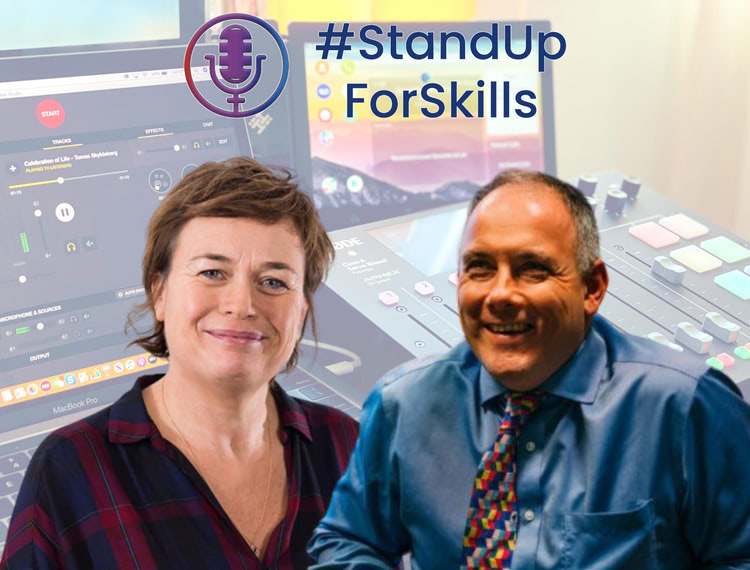Traditional academic learning has got to evolve to reflect the fourth industrial revolution

#StandUpForSkills – Recovery and Resilience: Reskilling Our Way Back into Work
It’s very apt that [this Recovery and Resilience report] comes on the back of the prime minister only this week talking about Build, Build, Build. I think we would probably say Skills, Skills, Skills. Basically, what we’re talking about in the report is the need to act now.
The nuance of the report is possibly different to some of the other really good reports, that are also saying very similar things about what’s needed to actually help us through, what is from an economic and jobs crisis point of view, one of the worst we have possibly ever see in our lifetimes.
Its research with YouGov, where we looked at those who were going to be hardest hit, and what needs to be done to really help the poorest face that toughest climb back out of unemployment post COVID.
In many respects, the calls to action are largely around let’s redirect the funding that’s already available. I’m sure Rob will talk later about some of his passions around creating skills, credits and incentives for employers, just to keep young people, and indeed adults, in work where we can because, this economy is going to recover eventually and we need to stick with it, and make something happen now to start to address the problems we face.
Kirstie Donnelly MBE, CEO at City & Guilds Group
Are we on the cusp here of something big for FE and the skills sector?
Too often further education has been called the Cinderella sector, and I always like to respond to this by saying it’s worth reminding ourselves that Cinderella actually became a member of the royal family, and what we need to do is banish the two ugly sisters of underfunding and snobbery, and I think it could be potentially exciting.
The prime minister did his speech this week, at an FE College in Dudley, he’s been talking about the world of apprenticeships and skills. We’ve got an education secretary who went to an FE college. We’ve got a Skills Minister, Gillian Keegan, who is I think the only MP, I’m very jealous of her actually, the only MP to have done a degree apprenticeship in the House of Commons.
So, we are talking about apprenticeships and skills now in a way that perhaps we haven’t done for quite a few years. Obviously the proof is in the pudding, but the fact that reports like the one that City & Guilds have done, the Rolls Royce of training providers, a long-established blue-chip charity, that’s come out.
There is a mood out there to make this happen, let’s see what comes of it in terms of government policy. COVID has overshadowed everything, and it’s highlighted our existing huge skills deficit, but also the loss in terms, and the report highlights this, of people on low incomes, the apprentice redundancies, the fall in starts, the apprenticeship starts, particularly for younger apprentices, it’s nothing short of disastrous.
So when the prime minister says we’re going to have an opportunity guarantee for young people, whether it’s going to be skills, or learning, or an apprenticeship, it’s got to mean something.
This report helps flesh out the policy to make it happen.
Robert Halfon MP, Chair of the Education Select Committee
Will the proposals from the Recovery and Resilience report meet the needs of the labour market going forward?
You may have seen the speech regarding the HE minister’s view of what HE needs to do.
HE, FE or apprenticeships? True social mobility puts students’ needs and career ambitions first: Speaking to the @NEONHE summit on widening access and mobility, Universities Minister @MichelleDonelan outlines a new approach to social mobility: Thank you,… https://t.co/CshePSjoPL pic.twitter.com/n5qbSNLBLR
— FE News – The #FutureofEducation News Channel (@FENews) July 1, 2020
I think that probably is a telling sign that although Augar feels like it got kicked a little bit into the long grass, I don’t think it’s gone away. I have a feeling that we are into a period of rebalancing now and creating more equity. We need to create greater equity for those groups who are much further away from the socio-economic market.
What we’ve all recognised, and the report really does focus on that, is whatever happens now with policy, with funding, it’s got to be demand led. It’s got to be led by what local industries, what’s happening in those local regions, especially those where there is most deprivation.
Let’s just take infrastructure, we know there’s going to be huge investment, billions of investment, much needed investment in infrastructure. We heard the prime minister say, Build, Build, Build hence my slightly cheeky Skills, Skills, Skills, because you can’t build without skills.
Therefore, there is a really great opportunity now to really look at that demand, and really focus the opportunity to help people who have maybe be in one industry and now find themselves potentially unemployed.
How do they take their transferable skills and move from Industry A into Industry B? The opportunity for somebody, for example, maybe who’s been working in the airline industry. How might we find them working in the health care industry? Because some of the transferable skills do transfer across very, very well.
What we need is the funding and the mechanisms to make those short course interventions happen, as well as that, we mustn’t forget about the very important role of apprenticeships.
Kirstie Donnelly MBE, CEO at City & Guilds Group
Is a day of reckoning is coming for our universities, with the funding rebalanced towards FE going forward?
What I want is funding rebalanced to degree apprenticeships, to further education, to working whilst learning. I think the whole university experience has got to change. Let’s say you’re a history graduate, you would do a significant part of your time, perhaps in an apprenticeship, perhaps on a paid internship scheme or traineeship working in the British Museum, or in an archaeology centre, or whatever it may be.
The fourth industrial revolution is coming, millions of jobs are potentially going to be lost unless we reskill, retrain, and think about how we study. Traditional academic learning, I think has got to evolve to reflect the fourth industrial revolution. Further education colleges, as well as university technical schools are an important part of that.
That’s why the report says that at the moment businesses have a Research and Development Tax Credit, and the government’s very keen on that because they want more research and science, understandably. We have to, at this time, give businesses every possible financial incentive in order to hire apprenticeships, retrain their workers in the skills they need.
If they’re doing that, they should get a Skills Tax Credit as well, so I think that is very important. That should be funded, in my view, out of the three billion skills fund that the government have announced.
[A Skills Tax Credit] would work in the same way as the R&D Research and development tax credit. It’s not about recasting middle managers, getting them to do MBAs, it’s got to be in the skills that the country needs as well. So, if companies were retraining their workers, if they’re hiring young apprentices, they should get some financial incentive for doing so. I’m talking about non levy payers predominately here.
Robert Halfon MP, Chair of the Education Select Committee
Setting up Lifelong Learning & Employment Hubs
The call for action there is around the fact that we’ve already talked about the great provision we’ve already got through colleges, and also the role the independent training providers can play as well, in that.
We do need a different model. We mustn’t forget the impact that digital has had throughout COVID. We have it now, therefore, we mustn’t lose that opportunity to rethink how learning, how assessment, how even job support, and getting into jobs can be delivered digitally.
The whole idea of the lifelong learning & employment training hubs is to provide places that link out to existing provision, it’s not just about creating brand new provision, but also to provide a digital space where people can get the support they need, where they can find out in that demand led system:
- Where are the local jobs?
- Where are the vacancies that are available this week?
- What is the short course intervention that I might need in order to get me into that vacancy?
It’s about drawing on the best of what’s already out there in the local regions, but also creating a new overlay of collaboration between those organisations, so we absolutely get that right supply and demand tension.
Kirstie Donnelly MBE, CEO at City & Guilds Group











Responses